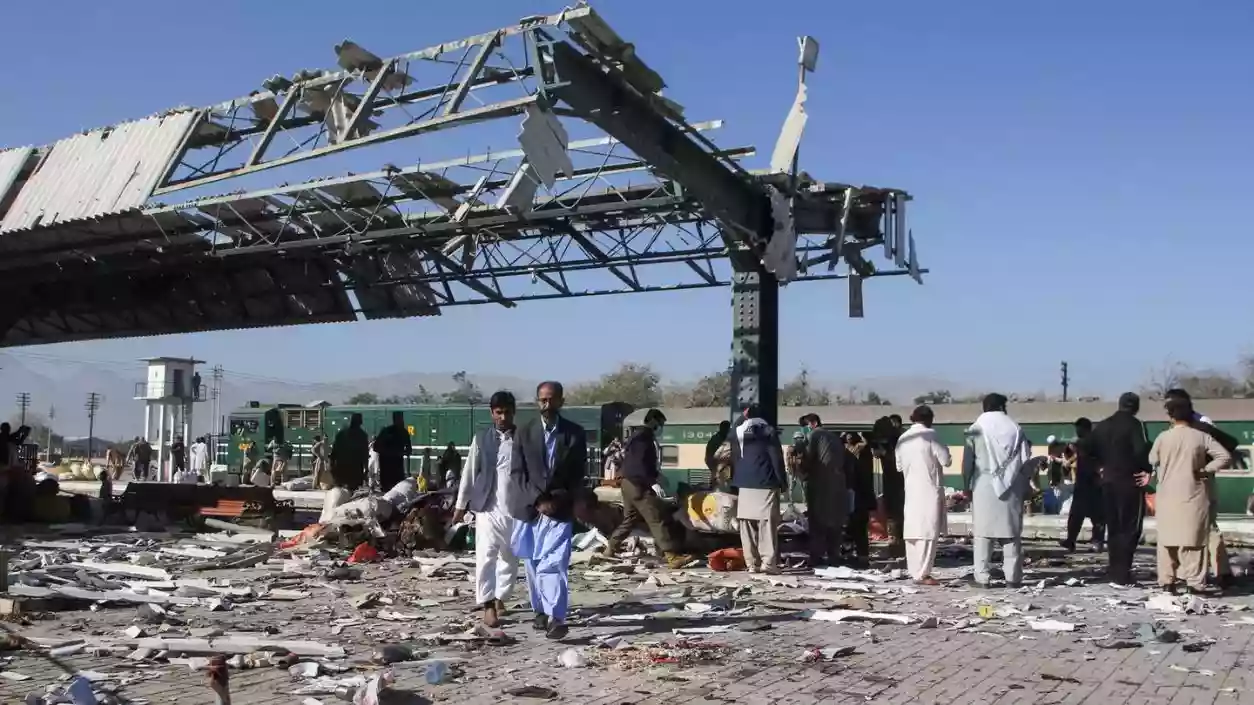.gif)
.gif)

At least 24 people were killed and 46 others injured in a bomb explosion at Quetta Railway Station on Saturday in Balochistan province, Pakistan. The blast occurred as passengers were waiting for the scheduled departure of the Jaffar Express to Peshawar, which was set to leave from the platform at the time of the explosion. Quetta’s Senior Superintendent of Police (SSP) Operations, Mohammad Baloch, confirmed that initial findings point to a possible suicide bombing, though investigations are ongoing to determine the exact cause and nature of the explosion.
The Baloch Liberation Army (BLA), a separatist militant group active in the region, claimed responsibility for the attack. Preliminary reports suggest that the explosion occurred near the railway station's booking office, causing significant damage. The impact of the blast was so powerful that it partially collapsed the platform roof and left large amounts of debris scattered across the area. Eyewitnesses at the scene described the explosion as deafening, with panic ensuing as people rushed to escape the chaos. The BLA has previously targeted security forces and government infrastructure, and the group’s claim points to its ongoing insurgency against the Pakistani state.
The explosion occurred at a busy time, with around 100 people present at the station, including passengers, railway staff, and vendors. Rescue and law enforcement teams quickly responded to the site. The injured were transported to Civil Hospital Quetta, and an emergency was declared in the hospital. Shahid Rind, a spokesperson for the provincial government, confirmed that additional medical staff was called to manage the high volume of casualties. Of the 46 injured, many sustained critical injuries, including severe shrapnel wounds, burns, and trauma from the blast's force. Authorities have confirmed that the number of deaths could rise as some victims remain in critical condition.
The blast severely damaged part of the railway infrastructure, including the booking office and roof. Security forces, including the Bomb Disposal Squad, arrived at the scene to investigate the nature of the explosion. Police cordoned off the area, and forensic teams were tasked with collecting evidence from the site. The authorities are focusing on finding clues to confirm the cause of the explosion and identify any possible perpetrators connected to the bombing. The government has promised to expedite the investigation and release further details as soon as possible.
Following the attack, Balochistan Chief Minister Sarfraz Bugti condemned the bombing as a “horrific act targeting innocent civilians.” Bugti issued a statement vowing that those responsible would be relentlessly pursued. He also expressed concern about the growing trend of militant groups targeting civilians, laborers, and children, calling for a strengthened security response in the province. Bugti has ordered a detailed investigation into the incident and has pledged to bring the perpetrators to justice. Balochistan is Pakistan’s largest and most resource-rich province but has long struggled with militancy and separatist movements. Separatist groups like the BLA accuse the Pakistani government of exploiting the region’s natural resources without providing benefits to the local population.
In recent years, these insurgents have increasingly targeted infrastructure, foreign investments, and military personnel. The BLA has been responsible for numerous deadly attacks in the past, including bombings, shootings, and sabotage operations aimed at both Pakistani authorities and foreign companies operating in the region. The provincial government has faced difficulties in controlling the insurgency, which has escalated violence in the province, particularly in areas with significant infrastructure projects funded by foreign countries like China. In August, the BLA claimed responsibility for coordinated attacks by dozens of militants that killed at least 39 people in the province. These attacks were among the deadliest in recent memory, underlining the growing threat posed by separatist groups in Balochistan.